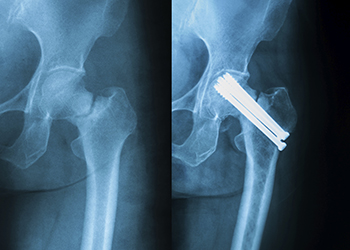
Though hip (femoral neck) fractures are much more common among older adults, when they occur in young people complications frequently develop, posing a challenge for the health care system.
Femoral neck fractures in patients aged between 18 and 50 years old are rare, accounting for only 2-3% of all femoral neck fractures. They are often the result of a high-energy trauma and, despite current best practices in treatment, complications frequently occur, requiring surgery.
Data access has been approved for a study led by Dr David Stockton, a 2nd year orthopaedics resident at the University of British Columbia, to examine the incidence of re-operation for these problematic fractures in the British Columbian population over a 28-year period.
“Due to the high-energy nature of the injury, 80% of these fractures are severely displaced,” says Dr. Stockton. “Surgery is performed for nearly all these femoral neck fractures to allow patient ambulation, promote healing, and preserve the native hip joint.”
“Unfortunately, complications following surgery are common, with an estimated 20% re-operation rate. Over half of young femoral neck fractures heal in a shortened or non-anatomic position. This alters the mechanics of the hip, causes the leg to be shorter, and may result in substantially worse functional outcomes and quality of life.”
Even patients who do not suffer a fracture healing complication frequently experience poor outcomes, adding to prolonged poor health and increased healthcare costs.
While the surgical complications and their functional outcomes are well documented, to date there has been no large population-based study to determine the true incidence of re-operation for femoral neck fractures in young people. Stockton hopes that with more accurate data we will be able to predict which patients will likely need re-operation and improve the long-term health of young, working age individuals who experience hip fractures.
PopData will link BC Ministry of Health data for the project.